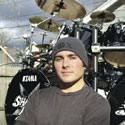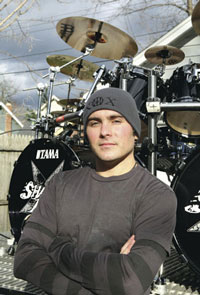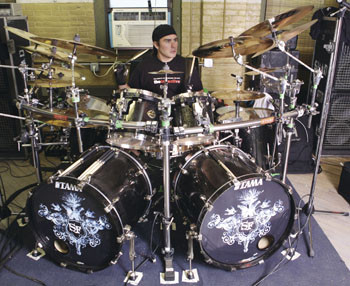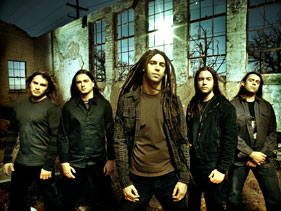
Shadows Fall Drummer Jason Bittner
Speed Demon
Gail Worley

Extreme metal band Shadows Fall have been a driving force in aggressive modern rock for so many years, it’s almost startling to realize that the group’s latest offering Threads of Life – the band’s fifth album – is actually its major label debut. When asked if he felt pressure regarding his performance for the album, knowing it would be Shadows’ first for Atlantic Records, drummer Jason Bittner had a very thoughtful response. “I felt that I had to step up my performance, period,” Bittner explains, “because I feel like that with every record. I always want to do something different, so that people take notice. On Threads of Life, for example, I played different beats than I’ve ever played on an album, including a shuffle, a 16th note disco groove and a few varied feels that I’ve never done before. Obviously, I want to give my best performance regardless of what label we’re on, not just for myself but for our fans.”
You’ve received some high honors from the recent Modern Drummer Readers Poll as “Best Metal Drummer” – an acknowledgment you’ve achieved fairly consistently over the past few years. How does that feel?
In 2005 and 2006 I got #1 for metal drummers. This year I was #2 and #5 for Best DVD. But the MD Poll has been very good to me as well as the Drum Polls. It makes me feel amazing because, at least for the Modern Drummer Readers Poll, it’s something I hold dear to my heart. I’ve been a reader of that magazine as long as I’ve been playing drums: over 25 years and I still have the first issue. It means a lot, however it’s still a Readers Poll – and I do understand that guys win due to the popularity of their bands. I’m just lucky enough to be in the position where both my band and me are very visible. That does help. I’ve never once felt that I am the #1 drummer in heavy metal, (laughs) because I know I’m not. There are plenty of guys who are way better than me. But to have that honor bestowed on you for one year is definitely very self-fulfilling and it makes you feel good about what you do. When I don’t know if I’ve made any kind of impact, or if I wonder if I’m any good, it helps to redefine your worth, so to speak. It makes you realize that yeah, you are doing something worthwhile in the field. All of the guys who place in these polls every single year are all the same players that deserve [to be] number one themselves. I was just lucky enough to get it a couple of times.
It’s hard to believe that Threads of Life is your band’s major label debut, as you’ve been a high profile act since your first album. It’s a great sounding record as well.
I think a lot of that is attributable to the fact that, number one, we are older guys who all grew up on ’80s thrash metal. We have a lot of varied musical interests across the board among the guys in the band, but the one common bond we have is that we all loved ’80s metal when we were kids. There was as much melody in the playing as there was aggression. I think that a lot of my playing has to do with my main influences, too. Initially, before I got into the metal guys, I was into Keith Moon, Neil Peart, John Bonham and Stewart Copeland. These were guys who weren’t playing at the same volume all the time. There’s a dynamic level there: you play for the song.
That’s always the attitude I’ve adopted when it comes to writing my drum parts. When my parts start to overshadow what the song is doing, then I have to scale back. You have to realize that you must play for the song regardless of what kind of music you play. It doesn’t matter how many fancy fills you could throw in or how fast your double bass [work] is: if it doesn’t work within the confines of the music [then forget it]. When you’re overstepping your bounds and stepping on other people’s toes just for the sake of trying to squeeze in that lick that you practiced in your basement for five hours, you need to remember that what you don’t play is as important as what you do play.
Was anything done differently for this record, say, with regards to songwriting, knowing it would be your first CD for a major label?
We’re just picking up where Killswitch Engage, Mastodon and Lamb of God have left off with their [most recent] records. When we signed with Atlantic we explained – as we explained to every label that we had meetings with before we decided on whom we were going to go with – that number one, this band has a track record already. We’d already put out four albums prior, and we’ve established ourselves. This is the kind of band we are. Yes, we want to expand on our musical capabilities, but if you sign us you have to understand that we are first and foremost a metal band, and that’s what you’re going to get this time, too. When we delivered the album to Atlantic they were like, ‘Wow, this is pretty metal.’ But they were happy that it was, because if it wasn’t then they were wondering what they were going to do with it. They didn’t want to step on our toes at all. It’s really been a great relationship so far.

For this album you worked with producer Nick Raskulinecz for the first time. What did he bring to your drumming performance?
In the past, we had a producer, Zeus, who was pretty much like a sixth member of the band and a champion of my drumming. He was always like, ‘Do it. Do whatever you gotta do.’ He loved everything I played. Let’s just say that maybe if I played a fill with a splash hit in it or I did something that was a little off time, or put some kind of accents in, Zeus would never say, ‘Hey, don’t do that there. It doesn’t sound right.’
On the other hand, Nick would say, ‘Dude, you know how you’re putting that little splash thing in there? Let’s try it without that.’ And of course, the first thing that my egotistical drumming side goes to, in the back of my mind, is to say, ‘No, because that’s the part and that’s what I want to play.’ But when you sit back and play it and actually listen to it in the context of the music, then yeah, take that little hit out. Don’t be so fancy with it; simplify the part a little bit because it just makes the song have more impact. Nick said, ‘On the other four albums, you’ve established yourself to the fans that enjoy your music. They already know you have chops.’ He likened it to Neil Peart. Everybody knows that Neil can play, but Neil doesn’t flaunt it in every single song. Nick said, ‘You’re going to have your moments on this album, definitely. So let’s do our best to make those moments really jump out instead of having a semi-moment in every song.’
So, that goes back to what you were saying about what you don’t play being as important as what you do play.
Exactly, it came back to me tenfold. There were songs where I had parts where I’d worked on something and in the end it got taken out. But then there were songs that I approached with a less-is-more attitude. Like on the ballad “Another Hero Lost,” I was going to take a very minimal approach to that, but when we started tracking it, every time through Nick would say, ‘Play more fills there! Make it a little heavier.’ And I’d be like, ‘More? Dude, this is the ballad.’ But he insisted, ‘it’s going to work.’ It was totally the opposite end of the spectrum from thinking I was going to play less, but I actually ended up putting more in. It’s what works for the song and the atmosphere at the time.
Describe your two-handed ride cymbal approach and why that works for you?
My two-handed stuff started initially with Neil [Peart], once again. He would play stuff where it would be two-handed patterns between the hi-hat and the ride cymbal, because he didn’t have two ride cymbals, whereas I like the sound of the two, so that’s where it started. What put me over the top was listening to drummers like Gene Hoglan, Richard Christy (Death) and Nick Barker (Dimmu Borgir) and hearing all their double ride stuff in the death metal genre. Basically, those three guys were really my inspiration to start using more of the two-handed ride approach.
The first time I used the second ride cymbal was in the summer of 2004. At that time I was recording tracks with James Murphy for the Death tribute Album, which is still yet to come out (laughs). I put the ride cymbal up because I’d done a couple of songs that were Gene’s and I wanted to replicate the parts in the right way. [But after that] I never took it down, so when we went out on Ozzfest 2005, I kept the ride cymbal up. I would do the parts that I had played before on the albums and then I started experimenting a little more, too. Over the last two years my left hand has almost gotten to the point where I can now pretty much do everything with my left hand on the ride that I can do with my right hand. I think that primarily comes from me being left handed, so naturally that’s the hand that would want to do more. However, I do play a righty kit and I’ve played that way for years. I think I have that advantage from being naturally left handed, but the ambidexterity that has opened up for me has been amazing. One of the best things about it is that on those songs that we’ve been playing for years and years that sometimes can get a little stale, now, if I’m playing all the ride cymbal stuff with my left hand instead of my right, well that’s a totally different ball game. It’s actually given some of the old songs a little bit more life. I do a lot of double hand-double feet, matching the rides with the kick drum patterns and such. It’s one of those things that have become part of my signature moves.
Reviewers and critics are also saying that you’ve brought groove back to metal drumming. What do you think about that?
That’s something that I’m really happy about and I like hearing that. It’s funny too, that you mention that, because I’ve been working on this Burning Human record (Jason’s other band) and for the most part it’s very death metal oriented. There’s blast-beat stuff that I haven’t really done on a record before. But when we were tracking the album I was talking to the engineer on the project, and he was like, ‘You know dude, you keep talking about what you want to accomplish on this record. You show that you can do these blast beats, but I think that what this album’s really going to show is how much you can groove.’
I never thought about that in the context of this music/that album, until he said it. Then I started thinking about it and I was like, there is definitely a lot of groove in here. It’s the growling vocals and everything, but going back to Shadows Fall, part of the reason why I think the groove stands out so much with the band is that when I auditioned for the band they had gone through a series of drummer after drummer, and they couldn’t find the right guy for the job. Part of the time it was because guys were coming in to audition who were great players, but they were just trying to play every single lick they knew over the Shadows Fall tunes, which is not what they were looking for. When I went in to audition they said, ‘Look, we’ve had a lot of guys come in here and basically we’re looking for someone who has feet, but can be Phil Rudd when he needs to be.’ That summed it up right there: lay down the four/four groove, make people move, but when the craziness needs to be there, you need to bring it.
That was the happy medium I feel I provided for them. That’s the thing; you’ll notice that there are a lot of other drummers out there who do a lot more intricate, crazier stuff than I do. There are times where I’m just playing an 8th note groove or even a quarter note beat, but it works for the song. It makes people move. The bottom line is that the most important part of being a drummer is to be able to play a four/four groove and make people tap their feet and dance. I like the fact that I do get the groove element back in there, and that definitely, for me, comes from my John Bonham influence. I was majorly into John Bonham when I was a kid. Then once I got into the metal end of it, Dave Lombardo had a great groove to what he played, so I think some of it came from that. A lot of it also came from when I was initially into the lighter side of metal listening to Motley Crue and playing Tommy Lee stuff. All these guys had that groove behind them. They had the flash and the tricks, but they also had the pocket. The most important thing you can do as a drummer is keep the pocket.

As a player who’s lauded for his speed, what do you tell your students about the importance – for lack thereof – of playing fast as it relates to playing well?
As far as speed, I always have a section in my clinics on double bass, because that’s one of the things that I’m most commonly asked about. Usually the question is, ‘How can you play so fast?’ And my answer is ‘years of practicing!’ (Laughs) There’s no secret to it. It’s just years and years of practicing. For me, it took a long time. For some people it takes less time, and that’s great. First of all there’s always something about double bass and I’ll always go into the fact that this takes time. Some of the most important advice I can give is to start slow and play the beat with power, conviction and a great sense of timing, because it doesn’t matter how fast you can play – you can’t run before you can walk. I would rather have a student come in and play me an exercise at the slowest speed imaginable, get it right and have it down and solid than have him come in and try to play it at twice the speed and have no idea what he’s doing. Either the feel is wrong or the accents are wrong or he’s just not playing the pattern correctly. You have to start at the bottom to get to the top is how it works, I guess. It doesn’t come over night.
Another thing I like to stress in clinics is to be open to all different kinds of music and, as a drummer, try to have some knowledge of different styles of music as well. As a drummer you’re only as valuable as what you can deliver, so you need to think about things – not that I want my band to come to an end – and when you get into the position where maybe years down the road you’re not just the drummer from a certain band anymore, but you’re a [working] drummer and you’re known for being able to play in various situations. Terry Bozzio and Steve Smith are perfect examples of this. Yes they were in Missing Persons and Journey, but these guys have established themselves as international drummers, for whatever situation. The point is, be familiar with other kinds of music, because you never know what your future is going to hold for you.
I’ve found that practicing Latin grooves with metal works really well together. These are all things that I go through in my clinics. I have this program that I run that I call “Metal-fying.” What I do is go through and show people how to practice various kinds of beats and various styles of music, but also keeping it in the confines of what I like to play in my personal time. I’ll show the student how he can take one style and apply it to a different style.
Because I had a year of schooling at Berklee, I was able to start learning a little bit about jazz and Latin styles. I’m not an expert at playing those styles and I don’t play them half as well as I play metal, but the point is I know the basic beats and feels. If I got stuck in a situation where the lounge band at the Holiday Inn’s drummer had a heart attack, and I was sitting at the bar, I could go sit in with the band and hold them together.












